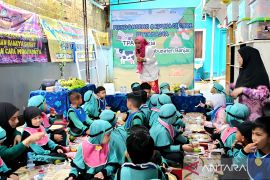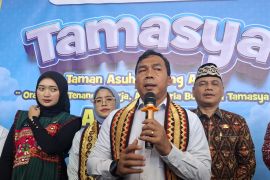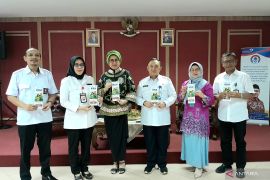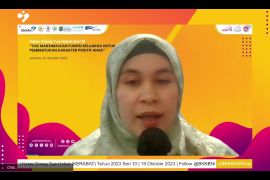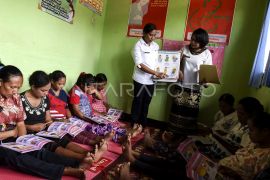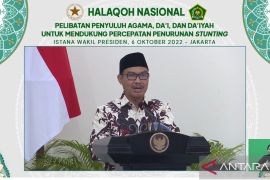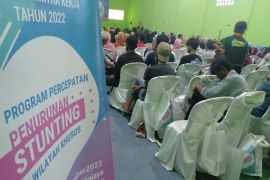President Joko Widodo (Jokowi), on August 5, 2021, signed Presidential Regulation Number 72 of 2021 on the acceleration of stunting reduction. The regulation sets targets that need to be achieved by the relevant parties for expediting stunting reduction.
So far, stunting handling has been focused on children, with stunting described as a failure in growth and development in children due to lack of nutrition over a long period of time.
Stunting can also be caused by repeated infections and inadequate psychosocial stimulation, especially in the first 1,000 days of a child's life. In contrast to children who are genetically short, stunted children are short because they cannot grow optimally.
Stunting can even lower children's intelligence and make them prone to chronic diseases such as diabetes, hypertension, and obesity in adulthood.
The Indonesian Nutritional Status Survey (SSGI) in 2021 recorded Indonesia's stunting prevalence at 24.4 percent.
According to head of the National Population and Family Planning Agency (BKKBN), Hasto Wardoyo, stunting is a threat to national development because it can make the quality of human resources poor.
For that reason, since 2021, the government has started to strengthen synergy and commitment through Presidential Regulation Number 72 of 2021 on stunting reduction acceleration.
Realizing that handling cannot start after a child is born, the targets of stunting prevention now include teenagers, prospective brides or potential couples of childbearing age, pregnant women, breastfeeding mothers, and children aged 0–59 months.
"Stunting prevention must be carried out starting from before marriage. This is (necessary) due to the high rates of anemia and malnutrition in young women before marriage so that during pregnancy, they have a risk of producing stunted children," Wardoyo added.
Family assistance
According to the deputy for advocacy, mobilization, and information at BKKBN, Sukaryo Teguh Santoso, the agency has already conducted the 2021 Family Data Collection (PK-21), which will be used for stunting reduction policies and for the Targeting of the Acceleration of Extreme Poverty Elimination (P3KE).
The PK-21 data updation carried out from September to November 2022 has pegged the number of at-risk families at 70,759,056 compared to 68,487,139 before the data was updated.
The data shows that Indonesian families are still in the developing stage.
Given the continuous growth in the number of families in the country, the BKKBN has seen the need to provide assistance to improve the quality of families, including by deploying 600 thousand personnel in 200 thousand family assistance teams (TPK).
The teams have been formed to identify the problems, starting from the village level to the family level, and have been tasked with conducting counseling, enabling access to referral services, assisting in the provision of social assistance, and monitoring targeted families that are at risk of stunting.
Each team consists of a midwife, a Family Welfare Movement (PKK) cadre, and a family planning cadre. Before carrying out their tasks, the teams are trained and provided modules related to family care tips, knowledge of balanced nutrition, and reproductive health education for families at risk of stunting.
One of the focuses of the assistance is increasing the nutritional fulfillment of prospective brides to prevent chronic energy deficiency (CED) and anemia, which can cause women to give birth to stunted babies.
According to the Deputy for Family Planning and Reproductive Health at BKKBN, Eni Gustina, assistance needs to be provided before marriage because the percentage of female adolescents (aged 15–19 years) at risk of CED is still around 36.3 percent.
Meanwhile, the proportion of women of childbearing age (aged 15–49 years) at risk of CED is 33.5 percent, and the percentage of those at risk of anemia is 37.1 percent.
To this end, the assistance provided by TPK at homes needs to be strengthened through cross-sectoral collaboration. The BKKBN is collaborating with the Ministry of Religious Affairs to create a mandatory program that covers assistance, counseling, and examination of height, weight, upper arm circumference, and hemoglobin levels, which can be carried out starting three months before marriage to ensure that future brides are in a healthy condition for marriage and pregnancy.
All couples are also required to conduct health checks and receive assistance three months before marriage and get marriage guidance, which includes learning materials on stunting prevention. The hope is that risk factors for giving birth to stunted babies can be identified and eliminated before marriage and pregnancy.
In addition, the BKKBN has strengthened education on cleanliness and reproductive health down to the district and city level through Planning Generation (GenRe), a forum that involves the youth in encouraging their peers to prevent two other stunting factors, namely child marriage and free love.
The BKKBN has also appealed to couples contemplating marriage to meet the ideal age for pregnancy and marriage, namely a minimum of 21 years for women and a minimum of 25 years for men, in order to make healthy and mature families and be financially independent.
According to the BKKBN head, the optimization of stunting eradication needs support from other parties, such as religious leaders and religious instructors. To this end, the agency, together with the Ministry of Religious Affairs, has created audio-visual Information, Education, and Communication (IEC) materials as learning materials for religious instructors to carry out outreach and implement the IEC approach for stunting handling.
Director of Islamic information at the Ministry of Religious Affairs, Ahmad Zayadi, promised to deploy existing instructors numbering more than 52 thousand to give sermons on not only stunting but also family development from a religious standpoint.
Environment and sanitation
Apart from providing assistance, the BKKBN is also focusing on improving the quality of families by creating a clean environment and ensuring access to sanitation and clean water.
Based on a series of working visits in 2022, it has been observed that many families, such as those in South Timor Tengah, East Nusa Tenggara, and Medan, North Sumatra, do not have toilets or adequate access to clean water.
The BKKBN, with the Ministry of Public Works and Public Housing, will help the targeted families so that they can live well and comfortably.
Minister of Public Works and Public Housing, Basuki Hadimuljono, said that his ministry will assist the BKKBN by determining the priority target locations based on the results of the updated PK-21 data.
The ministry will provide clean water and sanitation facilities according to the predetermined loci.
The BKKBN will ensure all cooperations run well. The agency is also optimistic that the assistance given to families would help prevent the birth of stunted children and reduce stunting prevalence to 14 percent by 2024.
All the interventions that are based on research and data are expected to help the nation's children to grow healthy, smart, productive, and competitive.
Related news: Govt prioritizes development of human resources in 2023: Minister
Related news: BKKBN working with OISAA to expedite stunting reduction
Related news: VP commends Kowani's support to stunting reduction, prevention
Translator: Hreeloita Dharma, Raka Adji
Editor: Sri Haryati
Copyright © ANTARA 2023



